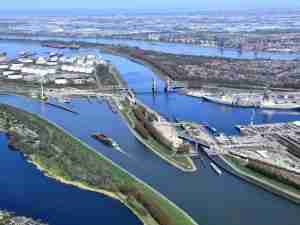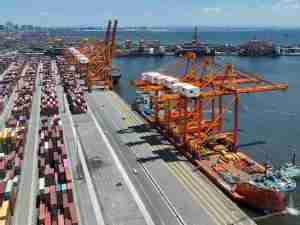In the first half of 2011, 215 million tons of cargo were handled in the Port of Rotterdam, 1% more than in the first half of 2010. Incoming cargo increased by 2% to 153 million tons, and outgoing cargo decreased by 1% to 61 million tons. The throughput of bulk cargo fell by 4% to 140 million tons. General cargo came out 12% higher at 75 million tons. Throughput of iron ore and scrap metal (-7%), crude oil (-8%) and mineral oil products (-9%) decreased. The other cargo categories were in the black: agribulk (+26%), coal (+6%), other dry bulk (+21%), other liquid bulk (+1%), roll on/roll off (+6%), other general cargo (+28%) and containers (+12%). In numbers, container throughput increased by 10% to 6 million TEU (20 foot equivalent units).

Hans Smits, CEO of the Port of Rotterdam Authority: ‘On the whole, throughput has maintained the high level of 2010. This also applies to investments from both the Port of Rotterdam Authority and companies. The growth in total throughput was hindered mainly by the loss in handling of oil products, which was very strong in the first quarter of 2010. Maintenance work to refineries was also relatively high. The 7 million tons decrease in the oil sector was almost entirely compensated by the more than double digit growth of containers. Just in the first half year, for the first time in decades, an entirely new cargo category was conveyed. LNG will not only contribute to transfers but especially to the structural strengthening of the industrial sector in the port and in the strategic energy position of the Netherlands and Western Europe. The Port of Rotterdam's positive development is connected strongly to world trade, especially that related to China and Germany. The significant unrest on the financial markets and its influence on the trust of consumers and producers can have a negative influence on world trade and thus on our throughput. There is a significant need for quicker and clearer political decision-making to sway negative sentiments. I expect that throughput in the third quarter will stay on target. July was a good month and the cargo for August and September is already in the pipeline. In spite of insecurity about the fourth quarter, I expect throughput for the entire year to show a light growth.’
Dry Bulk
The total quantity of dry bulk has declined by 3% to 43 million tons. The handling of agribulk (grain, seeds, animal feedstock) increased by more than a quarter to 4.6 million tonnes. The yield of wheat and rape seed in France and Germany was disappointing because of drought, and the export of Russian grain suffered because of an embargo. Imports from the United States compensated for this. A temporary reduction of the EU import tax on feed grains also had a positive effect on transfers.
12.7 million tons of coal (+5.5%) were handled. In the first quarter, imports were disrupted by the heavy rainfall in Australia and Columbia and thick ice in the Baltic Sea. Imports improved in the second quarter but the inland transport by water stagnated because of low water levels on the Rhine. Trains took up part of it. On balance, stock increased because demand for energy coal from Germany remained lukewarm. Stocks remained high in power stations as hot weather reduced energy demand, a lot of solar and wind energy was generated and electricity was imported from the Czech Republic and France. In the third quarter, coal throughput probably remains level because of stock-piling for the winter. Further increase is dependent on winter temperatures in Germany.
The throughput of ore and scrap metal fell by 6.9% to 19.4 million tons. The German production of crude steel increased significantly in 2010, but as good as stabilized in the last half year. In the second half of the year, an increase in ore imports is expected. Continued strong demand from the Turkish steel industry stimulated the export of scrap metal rise in the first half year. The handling of other dry bulk (especially minerals










